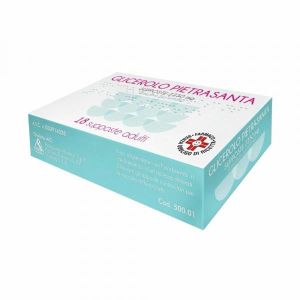Ship in Europe, Find out rates!

Pietrasanta Pharma Glycerol Pietrasanta Adult Suppositories 2250mg 18 Pieces
PIETRASANTA PHARMA
Therapeutic indications
Short-term treatment of occasional constipation
Dosage
Posology The correct dose is the minimum dose sufficient to produce an easy evacuation. It is advisable to initially use the minimum doses provided. Adults and adolescents (12–18 years): 1 suppository as needed, for a maximum of 1 or 2 doses per day. Pediatric population In children under 12 years of age, the medicine can only be used after consulting your doctor. Method of administration Remove the suppository from its container and then, if necessary, moisten it to facilitate its rectal introduction. If the suppositories appear softened, immerse the containers, before opening them, in cold water. Laxatives should be used as infrequently as possible and for no more than seven days (see section 4.4). A diet rich in liquids favors the effect of the medicine.
Overdose
Under normal conditions of use there are no known symptoms of overdose. In any case, excessive doses (laxative abuse - frequent or prolonged use or with excessive doses) can cause abdominal pain, persistent diarrhea with consequent loss of water, mineral salts (especially potassium) and other essential nutritional factors. Leaking fluids and electrolytes must be replaced. Electrolyte imbalances are characterized by the following symptoms: thirst, vomiting, weakness, edema, bone pain (osteomalacia) and hypoalbuminemia. In severe cases, the onset of dehydration or hypokalemia is possible, which can lead to cardiac or neuromuscular dysfunctions, especially in the case of simultaneous treatment with cardiac glycosides, diuretics, or corticosteroids. The abuse of laxatives, especially contact laxatives (stimulant laxatives), can cause addiction (and, therefore, the possible need to gradually increase the dosage), chronic constipation and loss of normal intestinal functions (intestinal atony).
Contraindications
• Hypersensitivity to the active substance or to any of the excipients listed in section 6.1. • Acute abdominal pain or of unknown origin • Nausea or vomiting • Bowel obstruction or stricture • Rectal bleeding of unknown origin • Acute haemorrhoidal crisis with pain and bleeding • Severe dehydration
Side effects
Below are the side effects of glycerol organized according to the MedDRA system organ class. Insufficient data are available to establish the frequency of the individual effects listed. Gastrointestinal disorders Isolated cramping pains or abdominal colic and diarrhea, with loss of fluids and electrolytes, more frequent in cases of severe constipation, as well as rectal irritation. Pediatric population No data available Reporting of suspected adverse reactions The reporting of suspected adverse reactions occurring after authorization of the medicinal product is important, as it allows continuous monitoring of the benefit / risk ratio of the medicinal product. Healthcare professionals are asked to report any suspected adverse reactions via the national reporting system of the Italian Medicines Agency.
Pregnancy and breastfeeding
There have been no adequate and well-controlled studies on the use of the medicine during pregnancy or breastfeeding. Although there are no obvious contraindications to the use of the medicine during pregnancy and breastfeeding, it is recommended to take the medicine only in case of need and under medical supervision.
Special warnings
Laxatives should be used as infrequently as possible and for no more than seven days. Use for longer periods of time requires a doctor's prescription after adequate evaluation of the individual case. The treatment of chronic or recurrent constipation always requires the intervention of the doctor for the diagnosis, the prescription of drugs and the surveillance during the course of therapy. It is also advisable that elderly people or those in poor health conditions consult their doctor before using the medicine. The abuse of laxatives can cause persistent diarrhea with consequent loss of water, mineral salts (especially potassium) and other essential nutritional factors. In the most severe cases of abuse, dehydration or hypokalaemia may develop, which can lead to cardiac or neuromuscular dysfunction, especially in the case of simultaneous treatment with cardiac glycosides, diuretics or corticosteroids. The abuse of laxatives, especially contact laxatives (stimulant laxatives), can cause addiction (and, therefore, the possible need to gradually increase the dosage), chronic constipation and loss of normal intestinal functions (intestinal atony). In episodes of constipation, it is first of all recommended to correct eating habits by integrating the daily diet with an adequate intake of fiber and water. When using laxatives it is advisable to drink at least 6-8 glasses of water, or other liquids per day, to help soften the stool. Pediatric population No data available.
Expiry and Retention
Store in the original package in order to protect from moisture and away from direct heat sources.
Active principles
Each suppository contains: Active ingredient: glycerol 2250 mg For a full list of excipients, see section 6.1.
Excipients
Sodium stearate, sodium bicarbonate.
| Destination | Cost | Detail |
|---|---|---|
| Italy | €5,90* | 24/72H |
| Austria, France, Germany, Slovenia | € 13* | 3 days |
| Belgium, Luxembourg, Portugal, Netherlands, Spain | € 14* | 4 days |
| Bulgary, Cechia, Hungary, Poland, Romania, Slovakia | € 19* | 5 days |
| Denmark, Estonia, Finland, Ireland, Lithuania, Latvia ,Sweden | € 22* | 5 days |
| United Kingdom, Switzerland, Greece | € 30* | 7 days |
| Canada, USA | € 40 | 7 Days |
European shipments with express courier: FedEx, MBE, DHL
*For the shipment outside band B ther's an extra cost of 22€ *For the shipment outside band C ther's an extra cost of 30€ Delivery Times exclude Saturday and Holidays
For Islands and Areas of difficult Accessibility the shipments are made in 72 hours and the cost will be increased by 15€